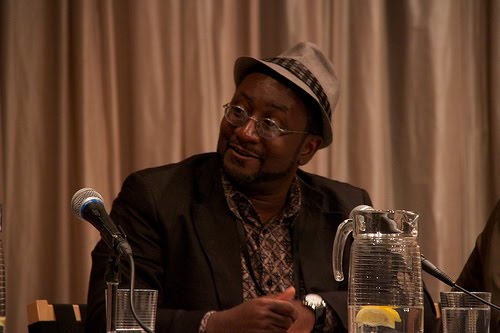Q: I saw your performance today at MDC. I think I have a book in me, I would like to write a novel, but I have to admit that I do not read books except those I must read for school. Can someone like myself who does not like to read become a great writer, or should I just give up and do something else?
A: I think I have answered this question before, or something pretty close to it. I find it to be a very annoying question and find that it shows up all too frequently.
My simple answer is this: give up and do something else.
People learn to speak, by listening to others (their mothers and fathers, their close household kin).
If no one speaks to you, then you will not learn to speak. It is as simple as that. And if you do speak, you will have no sense of how horrible you sound to other people.
So it is with writing. Writers learn to writer by reading.
Before we write, we must first read.
And if we write, without first having read, we will have no idea how horribly our books read to other people.
"But I don't like to read," you argue, "and I don't want my style to be influenced by anyone else's. I want to be original in my poetry and fiction."
Sigh. You're so young.
But, dear emailer, believe it or not, you have already been exposed to reading if you grew up in this country. You read nursery rhymes and Dr. Seuss, right? You read birthday cards, right? And that is exactly what your so-called original poetry is going to sound like--if you don't start reading lots of good poetry.
And whether you like reading novels or not, you have already been exposed to a very powerful storytelling influence: film and TV. And that is exactly what your so-called original fiction is going to sound like--if you don't start reading lots of good books.
In the beginning, your work may be (and sound) a bit derivitive of the good poets and writers that you are reading. That is to be expected as you are evolving into a creature with its own original voice. Think about the child who repeats the words and expressions of his/her parents and older siblings; ah, but in a few short years, the child is speaking his/her own original thoughts with his/her own original voice.
Writing is like that.
You can't help but to be original because you are you, and you are the only you there is.
But neither can you learn to talk, or to write, unless you begin by mimicking someone else's words.
This is as gentle as I can be in responding to this annoying question, but I sense that you are genuine in your search for an answer. If you ask me again, I promise not to be so nice.
People who do not read . . . groan . . . suffice it to say that writers are not fond of people who do not read.
Why in the heck would you want to write if you yourself do not like to read?
Why paint a picture if you do not like to look?
Why sing songs if you do not like to listen?
I am baffled by emails such as this.
Thanks,
Preston
